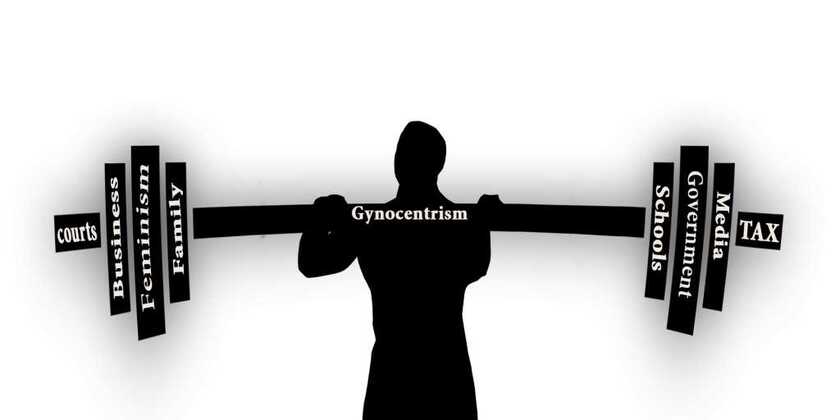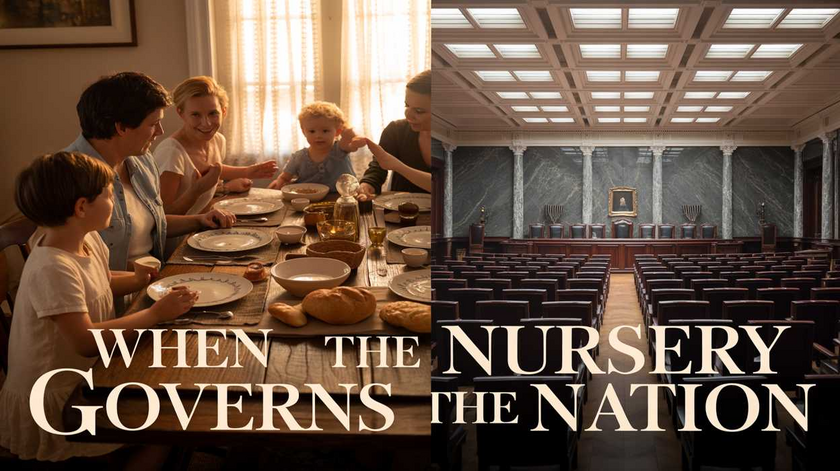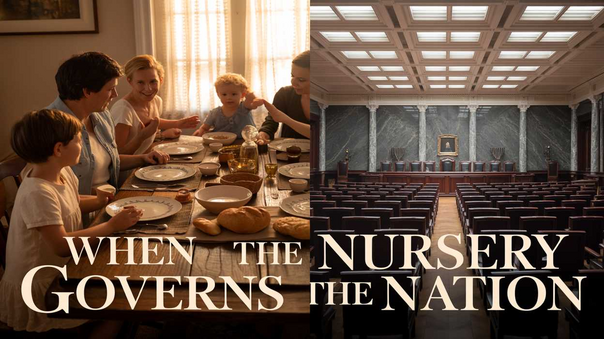This is the second post in this series on Gynocentrism. The first post offered an exercise to help see the degree of gynocentrism you might have. You can see that post here. This second post focuses on how to see gynocentrism in our world.
Men have been facing a chorus of antagonistic criticism and insults over the last 50 years. It started with them being called pigs and has devolved into the present-day insult of males being toxic. All the points in between have been filled with more insults and blaming men and patriarchy for every known feminine difficulty. But men don't fight back. Most men stay mum. They allow the lies and innuendo to be spun and spun with no rebuttal. This has left the culture convinced that men are indeed the problem. What a mess.
Why won't men fight back?
In order to understand the answer to that question we need to start with gynocentrism. What is it?
Gynocentrism is a largely unconscious bias in both men and women that leaves people thinking and feeling that women should receive special provisions and protections and that they are deserving of both. This is not without reason. When women are pregnant, they indeed need special provisions and protection. But gynocentrism is not selective in its application or its timing. It tends to be fairly global and applies to not just pregnant women but to all women at all times (although it is significantly increased when applied to a very attractive woman as in the cover photo). Gynocentrism impacts men and women on multiple levels and is deeply embedded into our culture and into our psyches. It even encourages that we go easy on women and excuse bad behavior. Recent research has shown us that when women are convicted of felonies, there is a gynocentric bias that pushes people to offer excuses for their crimes. Explanations like she was abused as a child, or mentally ill, or any number of other ideas offer special understanding for her deeds. Men generally do not receive such excuses. Other research has pointed to women getting over 60% lower sentences for a guilty verdict for the same crime as men. By default, gynocentrism offers women provision and protection along with a greater degree of empathy and understanding, rather than judgment. This is gynocentrism.
But why this difference? Why would men want to give women special treatment? The answer is that gynocentrism is connected to men's biological drive for status. Men seek status in order to get the girl. Men with the highest status are the men who are more often chosen as mates and this drives men to seek status. One of the paths to gain status is to be highly valued by women. How can you make that happen? By going out of your way to do for them. Men compete to try to impress an attractive woman and it is this connection to hierarchy and gynocentrism that drives that dynamic.
The gynocentric bias is common. Nearly everyone has it, and there are indeed some who are aware of this bias, and most of those are happy with it. For those with a strong blue pill influence, it just feels like the right thing to do, and very few are protesting the bias.
Gynocentrism is embedded in just about every facet of life, and no one sees it. It is basically invisible and pervasive. It runs silent, and it runs deep. It's like the air, unseen, and we take it for granted. Most of the time we don't notice the wind unless it starts rustling nearby leaves. Then we can see it, or we feel it blowing on our face. The same applies to gynocentrism. We rarely see it on its own, but we see it when it impacts something indirectly, not unlike seeing the impact of wind on the leaves. So how can you spot gynocentrism? Let's go over a few places where it is easier to see.
Gynocentrism on a personal level
We can see it in our culture by observing cultural assumptions that are automatic and deeply embedded in most of us. One example is the idea of ladies first. Whether it's to get in the lifeboats or something more mundane, we see the ladies-first idea played out around us and no one really notices or cares. Just do a search on ladies first and see what images come up. Then try one for men first and see what you get. Ladies first is an unwritten rule that is fueled by gynocentrism. It is interesting to note that with all of the ranting about how men and women are equal, the women first idea is less spoken now, and less visible but still easy to see if you look for it.
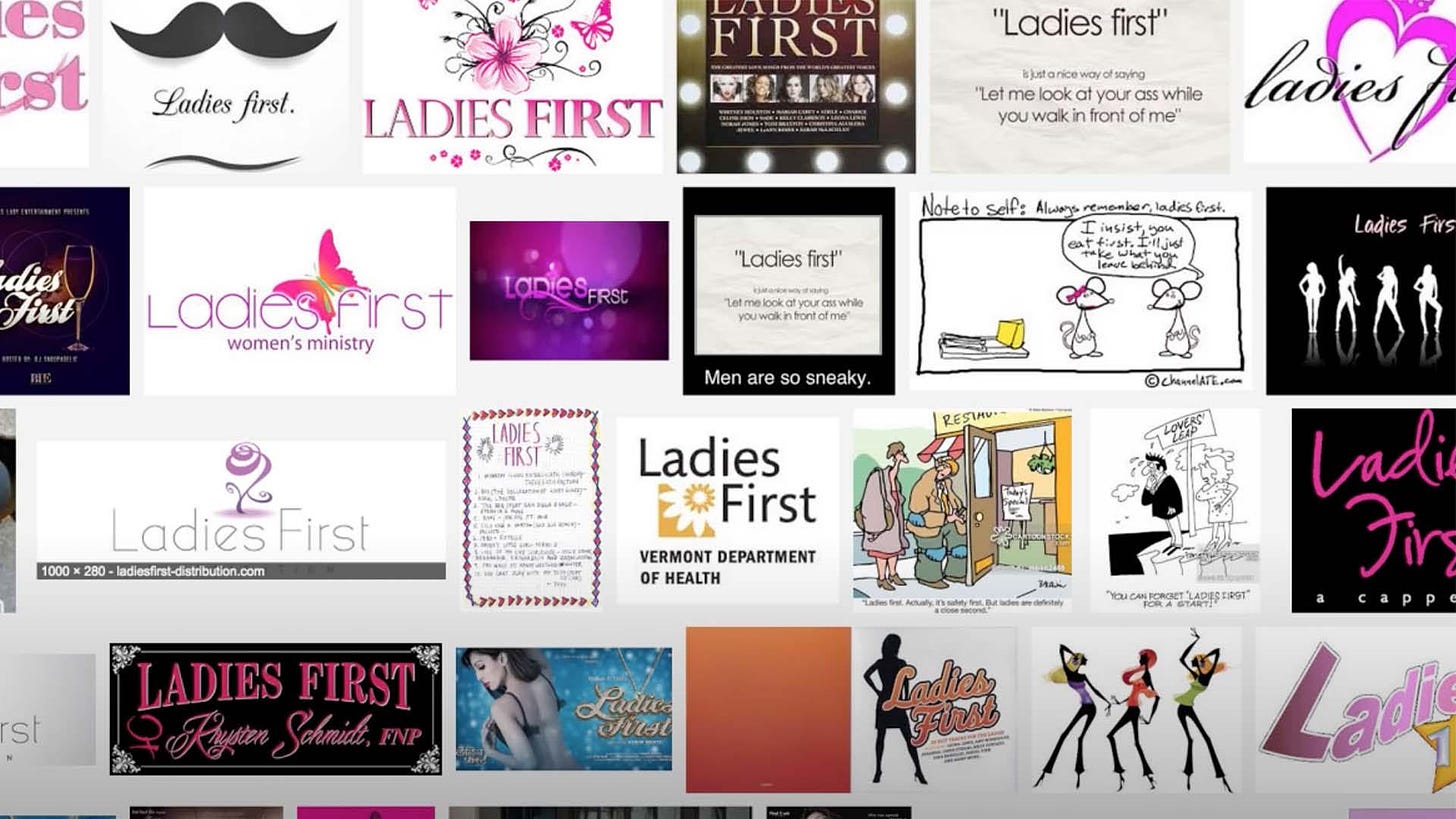
Another cultural custom that exposes gynocentrism is the age-old maxim to never hit a girl. Girls are to be protected. In fact, the message tells boys not only that they should avoid striking girls but also that they should enforce this maxim if they see other boys breaking the rule. The message is girls are different and are valuable and deserve protection. The indirect message is that other boys are the potential problem.
Sometimes we can see it when a wife asks a husband to do something. Often the husband will drop what he is doing to aid the wife. Have you seen that? Some husbands are slower than others, but the general trend is that the man will respond to her request. What happens when the man asks the wife to do something? In the couples therapy I have done over the years, it has looked like the wife was considerably slower in responding. However, when she asks, he responds. Maybe an easier way to see this dynamic more clearly is to observe that wives will often make "honey-do" lists, stick them on the refrigerator, and expect them to be accomplished. Have you ever heard of a man making a similar list for the wife? Not usually. This is just another example of how gynocentrism lives in our daily life. The needs and desires of women are seen as important while the needs and desires of men are treated less so.
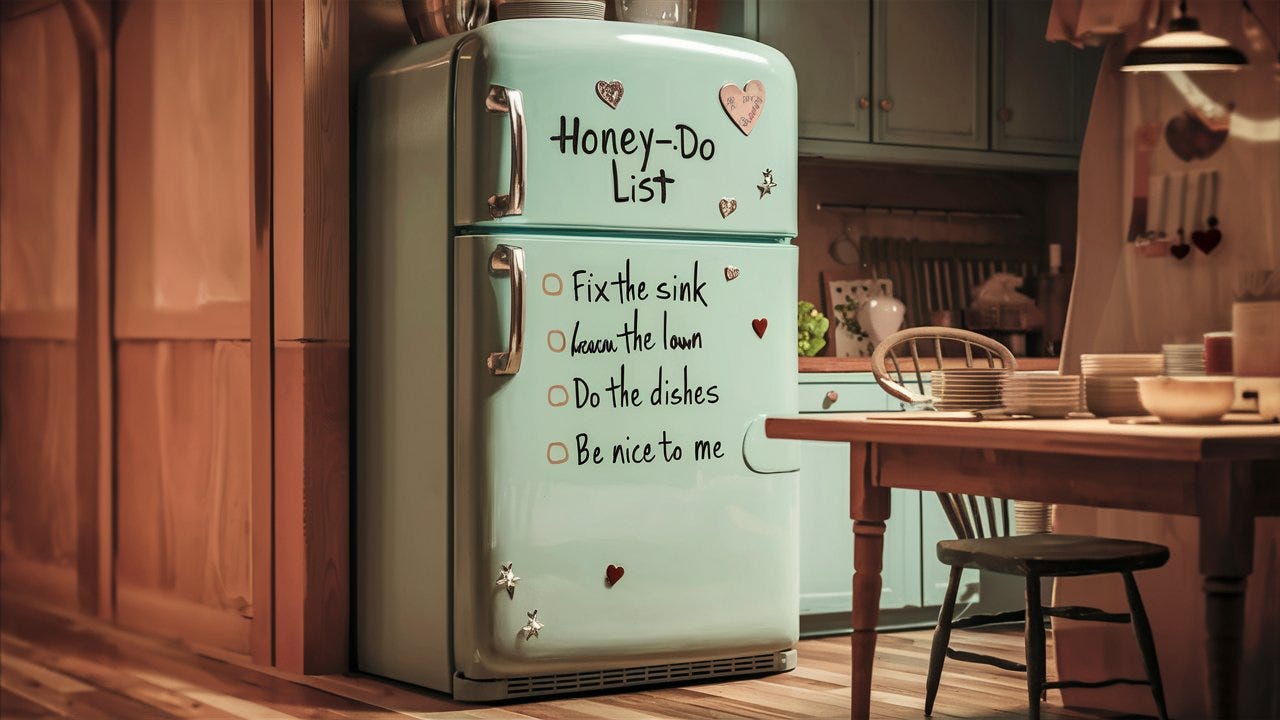
Then there is the old American saying of Motherhood and Apple Pie which is meant to honor two important elements of our culture, moms and a traditional delicious dessert. Listen to what AI says about this phrase.
"Motherhood and apple pie are often used as a metaphor to represent traditional American values, such as family, wholesomeness, and patriotism. These concepts are considered quintessential to American culture and are often used to describe things that are considered good, wholesome, and quintessentially American."
We can see the gynocentric filter in this statement. Holding mom up in the highest regard. Think for a minute about the phrase "Fatherhood and Apple Pie." It really doesn't work in the same way, does it? Gynocentrism is a part of what makes it work.
When young boys want to insult another young man, what is the easiest way to do this? Say something about his mother. You might get away with calling his father or brother names, but try it with his mother and watch the fireworks. She is sacred and held in very high esteem. She is also to be protected. Gynocentrism.
Think of an attractive woman pulled over on the side of the road with a flat tire like the cover photo. What's the chance that a man will pull over to help her? Pretty good, right? Now imagine it's a man pulled over with a flat tire. Who stops for him? I think most of us can imagine that the woman would get a good deal of help and the gentleman would probably not. Gynocentrism.
Other western gynocentric-connected traditions that have been common in the past have been men standing when a woman enters the room. This was done as a sign of respect. Another was holding her chair as she was seated at the table before the man takes his seat. Men would try to walk next to the woman on the street side of the sidewalk in order to protect her from any possible calamity. Offering women a seat in a crowded public vehicle is another example. Opening the door for the woman and allowing her to go through first. All of these were done to show respect and to acknowledge her as being both exceptional and deserving more protection and privilege than the men. All of these are connected to gynocentrism.
Gynocentrism on a legislative level
Perhaps the more lethal impact of gynocentrism is not the personal results of gynocentrism as seen above but the larger scale biases that live in our culture. Think of the personal bias we have seen thus far that is based on women first, women deserving special treatment, and basically their specialness playing into the personal treatment women receive. Think also of the men competing to impress the attractive women and for him to be seen as the "one true man" in her eyes, you know, the man who treasures women. Now take that same underlying bias and apply it on a national level. What you see is congressmen and senators jockeying to be the one who helps women the most. Not unlike the earlier persona version of men trying to impress an attractive woman. Look and you see things like the Violence Against Women Act which for the last 30 years has exclusively served women who were victims of domestic violence while ignoring the needs of nearly half of the victims, the men. The legislators were aware that males were victims. I know this because I was part of groups that would testify to this fact at the VAWA hearings and be totally ignored. Who was it that created the VAWA and made sure that it only helped women? Joseph Biden. He and many others made sure that they ignored the men and focused on women. This would be completely bizarre unless you had some understanding about how gynocentrism works.
Even back in the 19th century at the start of the industrial revolution we saw governments step in to insure safety of factory workers. But who did these laws protect? Most of them protected only women and children. Gynocentrism.
You see this same theme play over and over in the legislative branch of government. Our male legislators are vying to be the most helpful to women. It is what gets them re-elected. Think about it. We have at least 7 offices for women's health in our federal government but ZERO offices for men's health. Another area that exposes our governmental gynocentric bias is the reaction of legislators to outlaw female circumcision without exceptions but allow the circumcision of males to be the most popular surgical procedure in the US today. Girls are to be protected and boys don't count. There are a flood of laws that have been written to be of service to women but very few to be of service to men. Gynocentrism.
It's easy to see that gynocentrism has been present in our legislators pushing the ideas of affirmative action in the U.S. for 50 years. Women would be hired or promoted over more qualified men. That is the power of gynocentrism. Imagine it was reversed and the less qualified men were getting preference over more qualified women. That wouldn't last long.
We could go on and on with examples such as the vast majority of welfare being specifically for women, the suicide rates of men and the lack of legislative interest in helping, the focus on women's reproductive rights while ignoring any attention to men and their dilemma, or our boys struggling in schools while the legislators focus on helping girls. All of these things point to the same culprit: Gynocentrism. All of these problems could be addressed so much better if our legislators were aware of their inherent and unconscious gynocentrism and were able to adjust and be more egalitarian.
Gynocentrism on a social level
How about on a social level? Most people don't recognize the abundance of gynocentrism that is before their eyes. How many women only organizations are there? Lots. Men's organizations like the Lions Club, Rotary, or even men's barber shops have been cancelled and replaced by adding women into the mix. There are hundreds and maybe thousands of commissions for women. There is even a commission pulling together many of the commissions for women! There may be a handful of commissions for men. Maybe.
And just keep an eye peeled for all of the women only spaces. Women's parking, women only subway cars, women's gyms, women's banks, women only parks, and on and on. Do you see any spaces for men? No, they have all been diluted by adding women. Even the Boy Scouts has added girls! There are no male spaces left anymore with the exception of prisons and the ranks of the falsely accused.
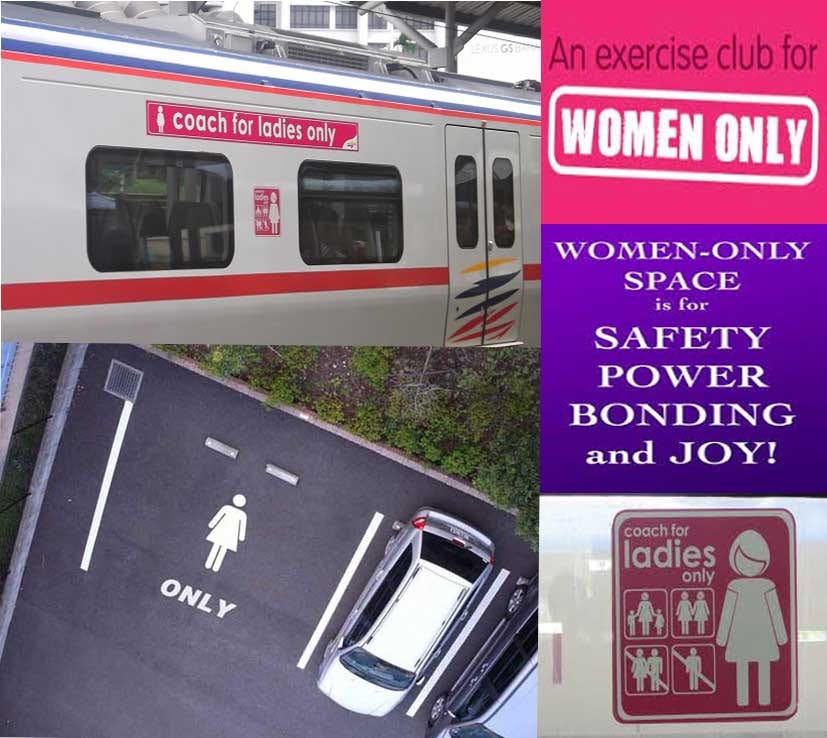
Gynocentrism on a Judiciary level
And then there is the judiciary. The family courts have been ravaging fathers and yanking them from their homes and their children for decades for no reason and no one raises their voice. Gynocentrism. The judges give females considerably less lengthy sentences for the same crime. Why? Gynocentrism. Yet another area is the many men who experience false accusations. We are in the era of people promoting the idea of "Believe All Women." (A very gynocentric idea) And it is not hard to imagine the hardship faced by a man who is falsely accused and is convicted unfairly by people spouting this phrase or those who strive to promote that idea. This is gynocentrism.
Gynocentrism in Academia
Gynocentrism in academia pushes a bias towards focusing on women. The chart below shows in pink, the times the phrase "women's health" is used in research articles indexed by PubMed between 1973 and 2023. The times the phrase "men's health" is used is shown in blue. And still what we hear is that women are ignored and need more. This is gynocentrism.
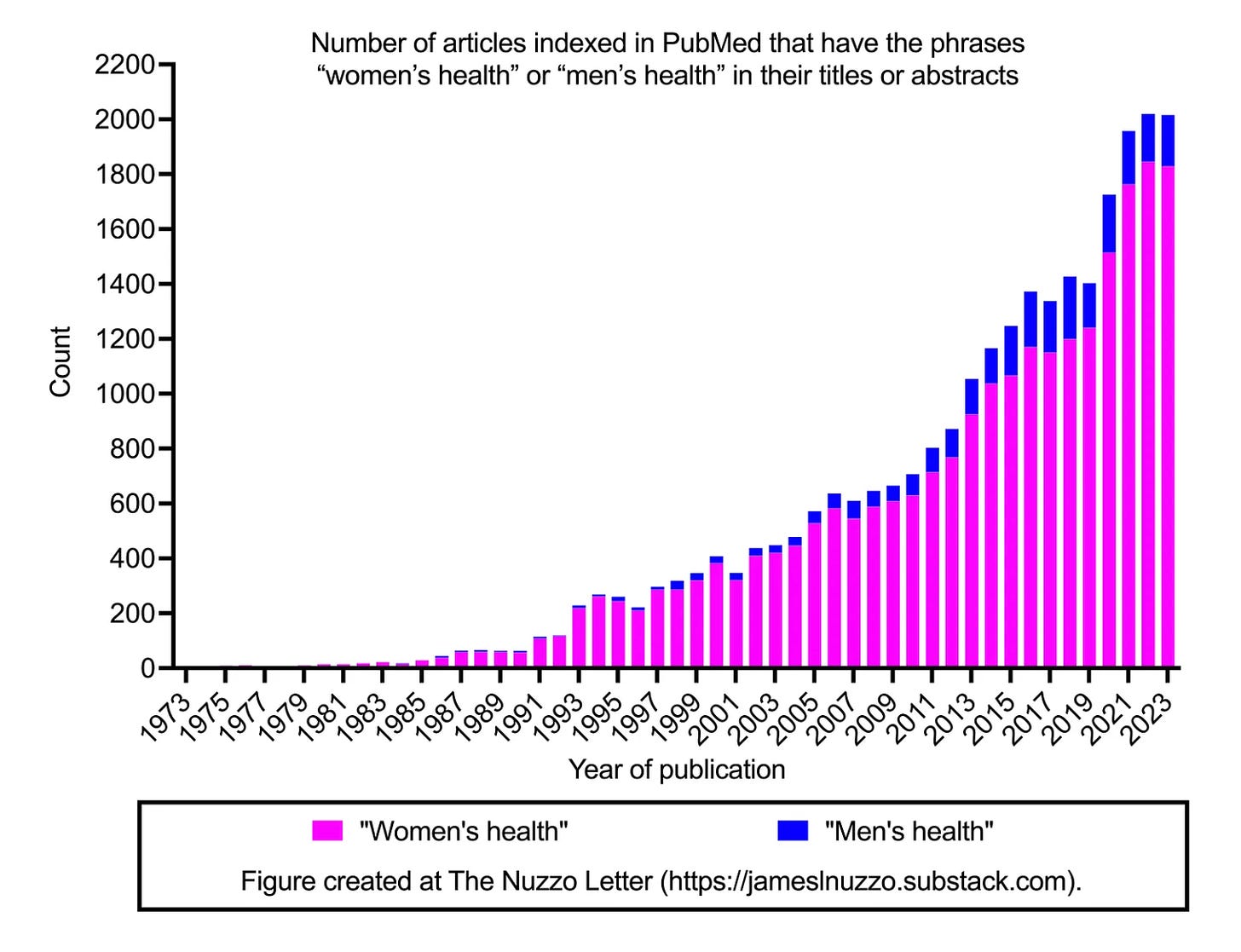
This next chart shows the number of men and women who participated in clinical trials at the NIH between 1995-2022. We so often hear claims that women are under-represented but the chart tells a different story.
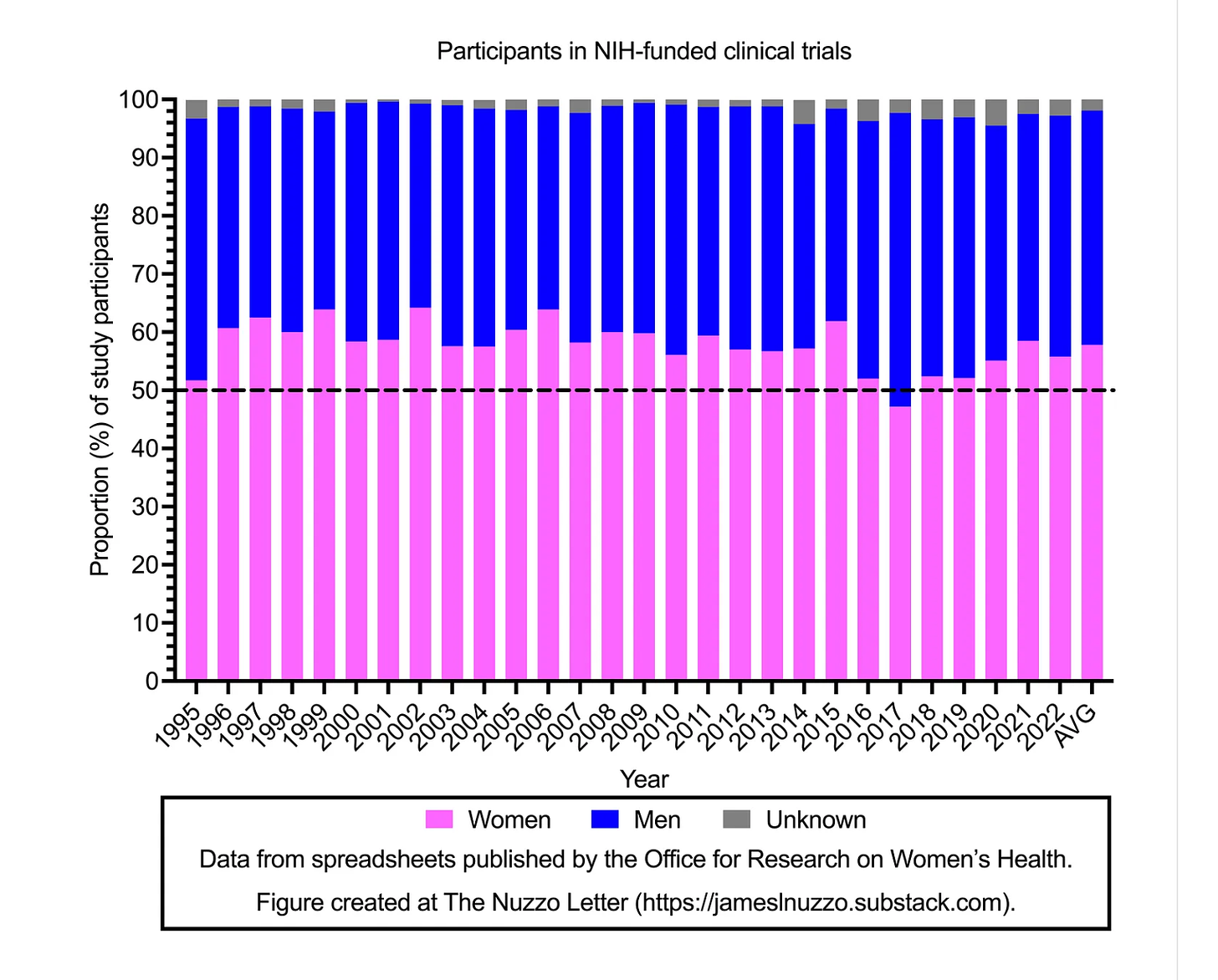
A researcher named Jim Nuzzo, created the above charts for his substack. He also did a series on the academic peer review process. The series makes it very clear that the system has a strong bias in favor of all things female and also has a negative reaction to anything that questions that, or that focuses on men and boys. You can see the first in that series here and see an article using the above charts titled Gynocentrism in Bio-Medical research here.
It is a sad fact that academia has been overwhelmingly saturated with interest for all things female. Women's studies is at the center of this huge bias and plays a role in not only narrowing the focus to just women and girls but at the same time blaming men and boys for just about every sort of problem one can imagine. This could never happen without gynocentrism. There have been attempts to start Men's Studies departments but those have either been attacked or lacked support and interest. Gynocentrism.
Gynocentrism in the mental health industry
The mental health profession surely has its share of gynocentric attitudes. In the years I have worked as a therapist, often I would refer a client I was seeing to find couples treatment with their spouse. No matter who I sent them to, a common theme unfolded. Each couples therapist would make the main objective the needs of the wife. Even when the husband had very pressing issues, they were often overlooked while the wife's concerns were given top priority. This was above and beyond what these therapists had been taught to do, and I am guessing this strategy was related to their unconscious gynocentrism. Ladies first.
Another blatant place where gynocentrism seems to reside is in clients who were abused by their mothers. I have heard from a number of people who had abusive mothers that when they entered therapy the issue became not dealing with the hardship and trauma of the abuse but instead in forgiving the mother! Gynocentrism. You can contrast this with the responses to having been abused by the dad. Different story. He was a bad guy.
It's also true that the mental health industry assumes that men need to be emotionally like women. This is a crazy and erroneous assumption that causes all sorts of troubles and the source of this error is, of course, gynocentrism, with its assumption that. of course, everyone should be like women.
Gynocentrism in pregnancy and childbirth
Gynocentrism even makes its way into pregnancy and childbirth. Just have a look at the IVF services in the US. It turns out the US IVF agencies are the only ones in the world to offer the option of choosing the sex of the baby. You can choose whether you want a boy or a girl. And what sex do White parents choose? 70% female according to an article in Slate Magazine titled “The Parents Who Want Daughters-And Daughters Only“. A quote from the article:
Grace, a 31-year-old who works in human resources (I’m referring to her by her middle name), told me, “When I think about having a child that’s a boy, it’s almost a repulsion, like, Oh my God, no.”
Preferring female offspring seems to me to be a more pathological sign of gynocentrism. It goes beyond the preference for women and seeking services and provisions for them and moves into the disdain of one sex over the other. This is pathological gynocentrism.
Gynocentrism Gives Women Protection
When you start observing things, you see that women, by default, live in a world that is geared to protect them and help ensure their needs are met. However, gynocentrism is about more. It is not just seen in families, relationships, or work; it is not just about safety and provisions; it spills over into the area of empathy and compassion.
I saw this in full blazing color when I worked as a therapist with grieving families who had experienced the death of one of their children. In each family I worked with, a similar dynamic would appear. The mother would get a great deal of attention from neighbors, family, and relatives who asked her supportive questions and listened to her troubles, etc. But the father was lucky if someone would approach him and ask, "How's your wife holding up?" It was so common that I had a phrase to describe what I was seeing. It went like this:
A woman's pain is a call to action. A man's pain is taboo.
That is the way it looked from my perspective. As much as the world complained about a man not "dealing with his feelings," it was painfully obvious to me that no one wanted to hear his feelings. Everyone ran away as if it was a taboo. Not so with the wife. Her pain was literally a call to action for people. They saw that she was in need and they would go out of their way to do something to help her. What I didn't know at the time was that the root of this difference was gynocentrism. She deserves to be heard while he deserves to help her.
So why is this the case? Why would a woman's pain be a call to action and a woman pulled over with a flat garner more help? Clearly, it is gynocentrism. Our world has been built by this, and gynocentrism has been a big part of creating our culture. I don't want to paint it entirely as a negative. I don't think it is, in its raw form. But anytime you have an automatic and unconscious bias there is surely the potential for trouble. It's also worth noting that the ideas we are talking about here are not black and white. Sometimes women will not get more attention than the gentleman. Sometimes his pain may be more of a call to action. So we are not talking about a binary here, but we are talking about strong and easily noticeable trends.
Gynocentrism - the unseen factor
It is amazing how deeply embedded gynocentrism is in all aspects of our culture. Gynocentrism indeed runs silent and it runs deep. Just about any place you look in the world you see it. Whether it is in relationships, the family, socially, the judiciary, the legislature, the community, academia and on and on. This short post is not meant to cover all of the ways that gynocentrism is a part of our lives. There are many more ways to see gynocentrism than we have discussed. A couple of these are the selective service, male-bashing and numerous others. If you think of some examples please offer them in the comments.
Next up is how women leverage the power of gynocentrism to get what they want and how feminists have taken a lethal step farther in weaponizing gynocentrism.
